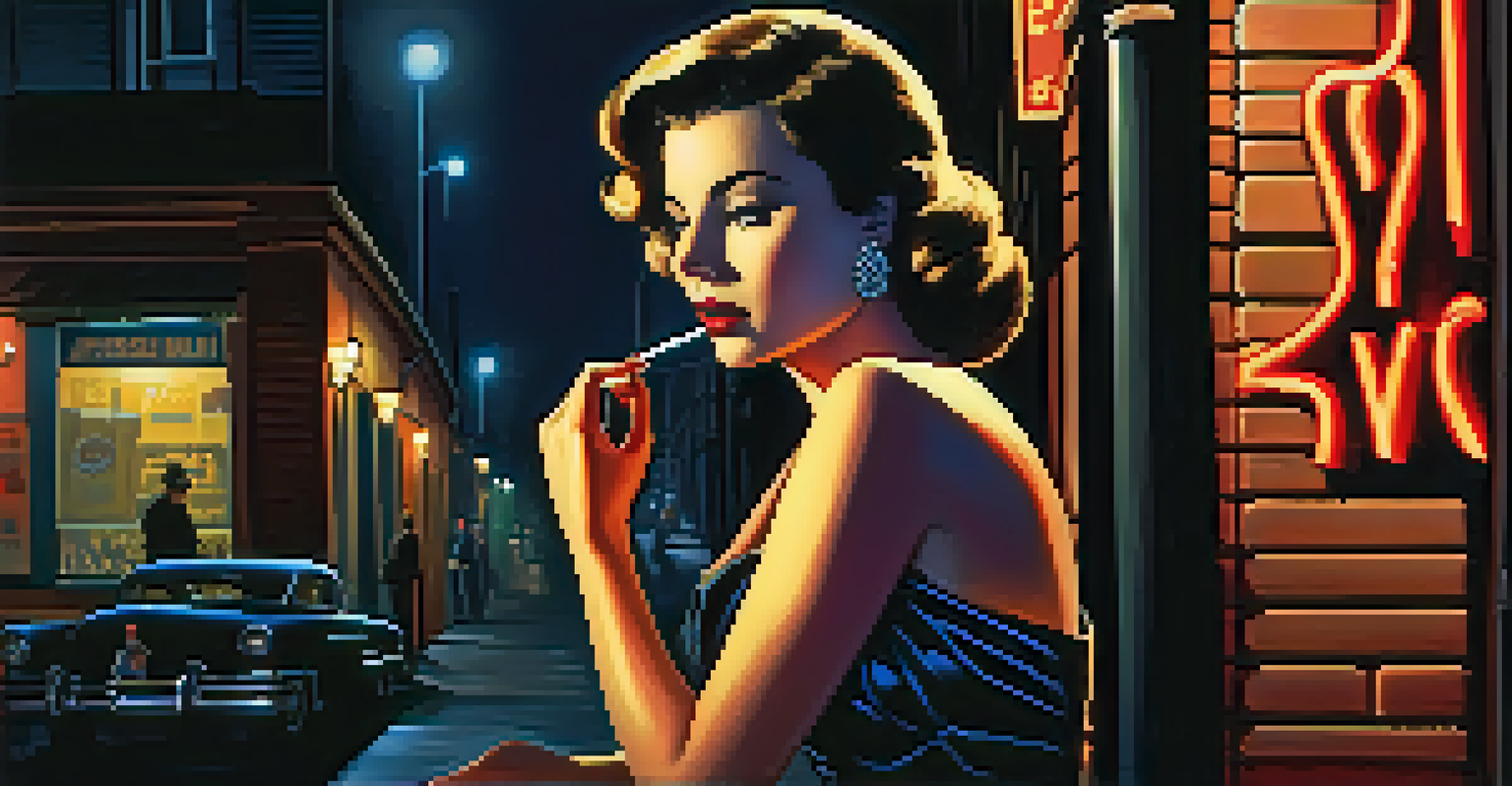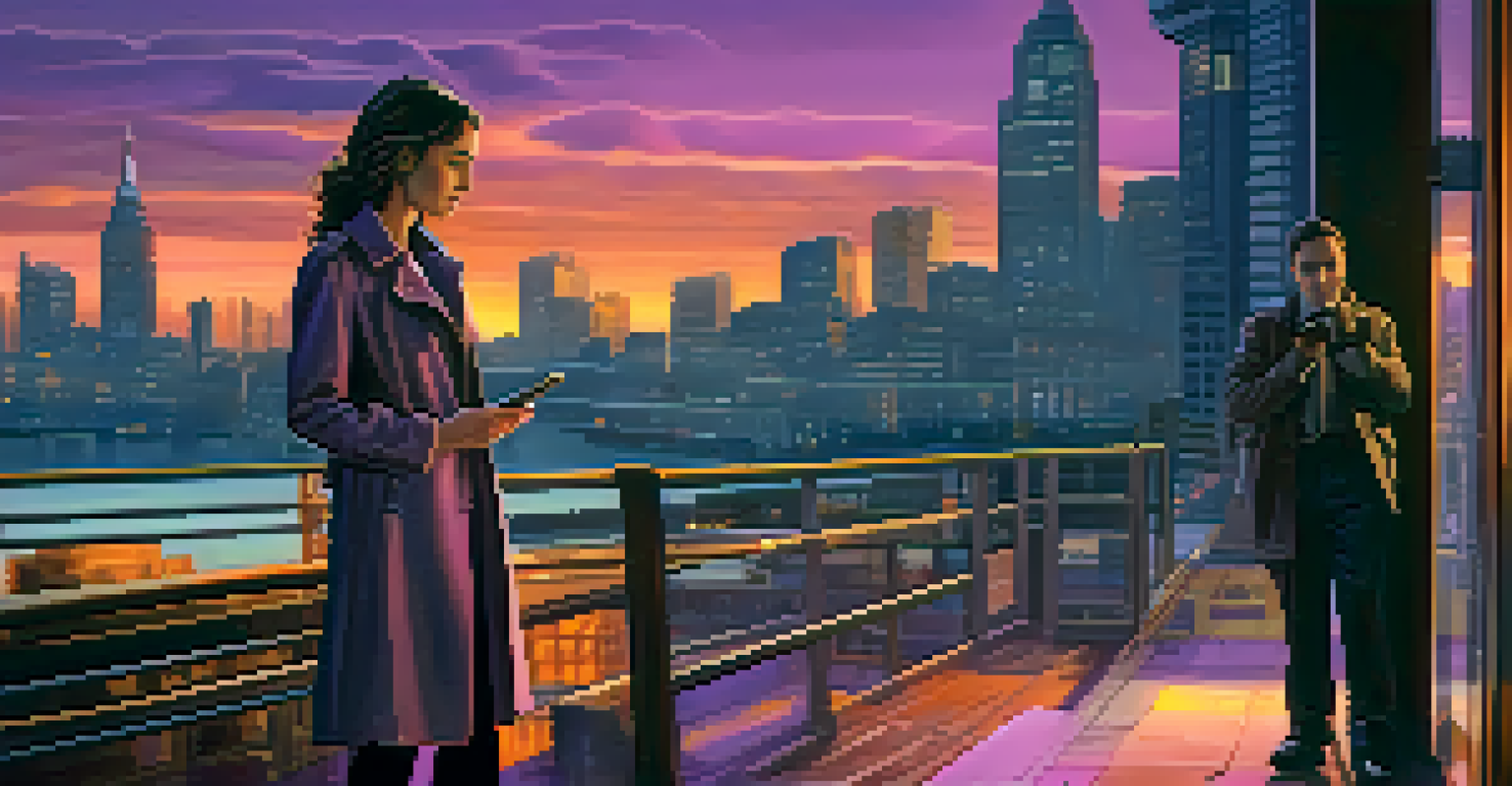Exploring the Mystery: The Evolution of Detective Film Genres

The Birth of Detective Films: A Glimpse into History
The detective film genre has its roots in the early 20th century, where silent films began to explore themes of crime and investigation. Movies like 'The Lodger' (1927) introduced audiences to mysterious plots, laying the groundwork for what was to come. These early films often featured a detective, or at least a curious protagonist, who sought to uncover the truth behind a crime. As sound technology emerged, so too did the complexity of storytelling within the genre.
Detective stories are a unique blend of human emotion and intellectual challenge, reflecting our deepest fears and desires.
With the introduction of sound, detective films became even more engaging. The 1930s ushered in a golden age, marked by classic films such as 'The Thin Man' and 'Murder, My Sweet.' These films not only entertained but also showcased the brilliant dialogue and character development that would become staples of the genre. Audiences were drawn to the charismatic detectives and their knack for unraveling intricate plots, setting the stage for future adaptations and innovations.
As we look back at this era, it's clear that these early films established the detective archetype—flawed yet brilliant characters who navigated the murky waters of crime. This foundation allowed the genre to evolve and adapt, paving the way for the diverse styles and narratives we see today.
Film Noir: The Dark Side of Detective Stories
The 1940s and 50s marked the rise of film noir, a subgenre characterized by its moody visuals and morally ambiguous characters. Films like 'Double Indemnity' and 'The Maltese Falcon' captivated audiences with their complex plots and femme fatales. The noir genre explored themes of betrayal, greed, and existential despair, providing a stark contrast to the more traditional detective narratives of earlier decades.

What set film noir apart was its stylistic elements, such as low-key lighting and unconventional camera angles, which enhanced the sense of mystery and suspense. The visual aesthetics mirrored the psychological turmoil of characters, making the audience feel the tension in every scene. This unique approach to storytelling allowed filmmakers to delve deeper into the human psyche, showcasing how crime often intertwines with personal struggles.
Detective Films Evolve Over Time
The detective film genre has transformed from early silent films to modern narratives, reflecting changing audience tastes and societal issues.
Film noir has left a lasting legacy on the detective genre, influencing countless films and directors. Its impact can be seen in contemporary works that embrace dark themes, proving that the allure of the detective story can thrive in a setting filled with shadows and ambiguity.
The Rise of the Private Eye: A New Detective Archetype
As the genre evolved, the classic detective archetype began to shift towards the private investigator, gaining popularity in the 1960s and 70s. This transition marked a departure from the traditional police procedural, as private eyes like Sam Spade and Philip Marlowe navigated morally gray worlds. These characters often operated outside the law, relying on their wits and instincts to solve cases, which added an extra layer of intrigue.
Film is a mirror to society, and detective films often expose the moral ambiguities of the world we live in.
Films such as 'Chinatown' and 'The Long Goodbye' showcased the complexities of the private eye, often placing them in situations that tested their ethics and resolve. The gritty realism and character-driven narratives resonated with audiences, as viewers found themselves invested in the personal journeys of these detectives. This era cemented the private investigator as a staple of the genre, influencing both literature and film.
With their flawed nature and complex motivations, private eyes reflect a more relatable human experience. They embody the struggle between right and wrong, making their stories compelling and relevant across generations.
Modern Detective Films: Blending Genres and Styles
In recent years, the detective film genre has embraced a blend of styles and genres, reflecting the changing tastes of audiences. Films like 'Knives Out' and 'Gone Girl' have combined elements of comedy, drama, and even social commentary to create unique narratives that keep viewers on the edge of their seats. This fusion allows for creative storytelling that breaks away from traditional molds, appealing to a wider audience.
Streaming platforms have also played a significant role in this evolution, providing filmmakers with the freedom to experiment with format and storytelling. Series like 'True Detective' and 'Mindhunter' have taken a more serialized approach, allowing for deeper character development and intricate plot lines. This shift has blurred the lines between film and television, creating a new landscape for the detective genre.
Film Noir Redefines Detective Stories
The film noir subgenre introduced complex characters and dark themes, significantly influencing the storytelling style of detective films.
As a result, modern detective films often reflect contemporary societal issues, making them more relevant and engaging for today's viewers. This evolution highlights the genre's adaptability and its ability to resonate with audiences across different contexts.
The Role of Technology in Shaping Detective Narratives
Technology has dramatically transformed the landscape of detective films, influencing both storytelling and character dynamics. The rise of digital forensics and surveillance has introduced new tools for detectives, creating opportunities for innovative plot developments. Films like 'Enemy of the State' demonstrate how technology can both aid and complicate investigations, showcasing the dual-edged sword of modern advancements.
Moreover, technology has altered how stories are told, with the use of social media and smartphones becoming commonplace in contemporary narratives. These elements not only enhance realism but also introduce a new layer of complexity to investigations, as characters navigate the digital world alongside traditional sleuthing. This evolution reflects the changing nature of crime and investigation in our society.
As technology continues to advance, it will undoubtedly shape the future of detective films, challenging filmmakers to keep up with trends while remaining true to the genre's roots. The interplay between technology and storytelling promises to foster even more engaging and thought-provoking narratives.
Cultural Influences: How Detective Films Reflect Society
Detective films often serve as a mirror to society, reflecting cultural attitudes and societal issues of their time. From the post-war disillusionment in film noir to the exploration of systemic injustice in modern adaptations, these films provide commentary on the human experience. They highlight the complexities of morality and justice, prompting viewers to question their own beliefs and values.
For instance, films like 'Se7en' and 'Zodiac' delve into the darker aspects of human nature, exploring the psychological effects of crime on both victims and detectives alike. These narratives challenge audiences to confront uncomfortable truths about society, making the detective genre a powerful vehicle for social commentary.
Technology Shapes Modern Narratives
Advancements in technology have transformed how detective stories are told, integrating digital elements that enhance realism and complexity.
As cultural dynamics shift, so too do the stories told within the genre. This adaptability ensures that detective films remain relevant and engaging, resonating with audiences while sparking important conversations about the world we live in.
The Future of Detective Films: Trends and Predictions
As we look to the future, the detective film genre is poised for continued evolution and innovation. With advancements in technology and changing audience preferences, filmmakers are exploring new storytelling techniques and narrative structures. The rise of interactive storytelling, for instance, offers exciting possibilities for engaging viewers in unique ways, allowing them to participate in the investigation.
Additionally, the genre is increasingly embracing diversity, showcasing a broader range of perspectives and experiences. This shift not only enriches the narratives but also allows for a more authentic representation of society. By incorporating diverse voices, detective films can delve deeper into the complexities of human relationships and cultural dynamics.

Ultimately, the future of detective films will likely be shaped by a combination of creativity, technology, and social awareness. As filmmakers continue to push boundaries and challenge conventions, the genre will undoubtedly thrive, captivating audiences for years to come.